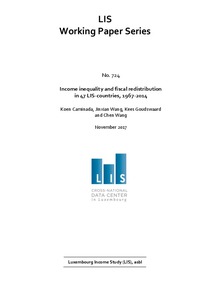Income inequality and fiscal redistribution in 47 LIS-countries, 1967-2014
"In most OECD countries the gap between rich and poor has widened over the past decades. This paper analyzes whether and to what extent taxes and social transfers have contributed to this trend. Has the redistributive power of different social programs changed over time? The paper contributes t...
| Main Authors: | , , , |
|---|---|
| Institution: | ETUI-European Trade Union Institute |
| Format: | TEXT |
| Language: | English |
| Published: |
Luxembourg
2017
LIS |
| Subjects: | |
| Online Access: | https://www.labourline.org/KENTIKA-19395836124911130189-income-inequality-and-fiscal-r.htm |
| Summary: | "In most OECD countries the gap between rich and poor has widened over the past decades. This paper analyzes whether and to what extent taxes and social transfers have contributed to this trend. Has the redistributive power of different social programs changed over time? The paper contributes to the literature by disentangling several parts of fiscal redistribution in a comparative setting for the period 1967-2014. We use micro-data from the Luxembourg Income Study (LIS) to examine household primary income inequality and disposable income inequality, redistribution from transfers and income taxes, and the underlying social programs that drive the changes. We offer detailed information of fiscal redistribution in 47 countries for the period 1967-2014, employing data that have been computed from LIS. LIS data are detailed enough to allow us to measure both overall redistribution, and the partial effects of redistribution by several taxes or transfers. We elaborate on the work of Jesuit and Mahler (2004) and Wang et al (2012 and 2014), and we refine, update and extend the Fiscal Redistribution approach. LIS data allow us to decompose the trajectory of the Gini coefficient from primary to disposable income inequality in several parts (i.e. 9 different benefits and income taxes and social contributions). The update and extension of the Leiden LIS Budget Incidence Fiscal Redistribution Dataset on Income Inequality (LLBIFR Dataset on Income Inequality 2017) allows researchers and public policy analysts to compare fiscal redistribution across developed countries and middle income countries over the last five decades. Research may employ these data in addressing several important research issues. Among the most commonly addressed questions in the empirical literature on the welfare state concerns the sources of variance across countries and over time in the extent and nature of fiscal redistribution. Changes (in the generosity) of welfare states can be linked to changes in the fiscal redistribution. Best-practice among countries can be identified and analyzed in more detail. In exploring the causes and effects of welfare state redistribution in the developed world, the literature has increasingly moved towards more disaggregated measures of social policy, an enterprise in which the LLBIFR on Income Inequality 2017, with its detailed data on taxes and a large number of individual social benefits, offers a rich source of information, which may be used by scholars and policy analysts to study the effects of different social programs on economic well-being." |
|---|---|
| Physical Description: | 93 p. Digital |

